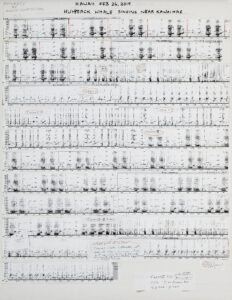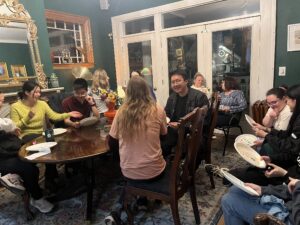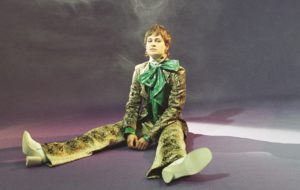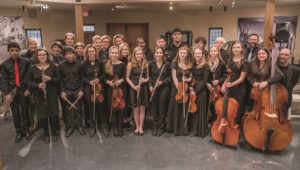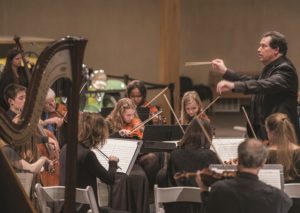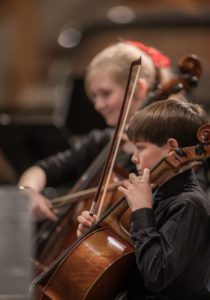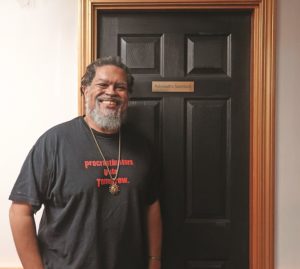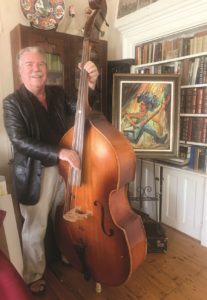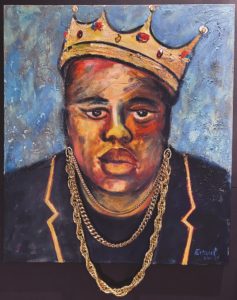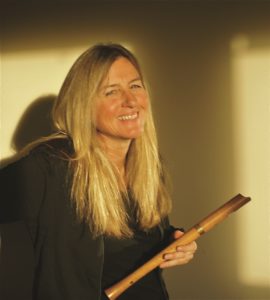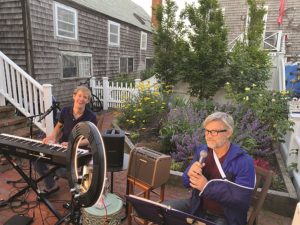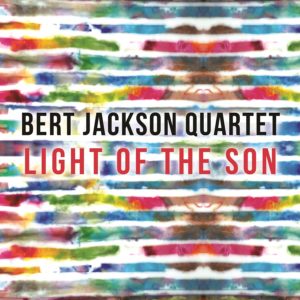Walter Buckingham’s first job after college was as a drummer for a musket squad. It was 1975, and he had just graduated from Berklee College of Music in Boston, so he also played rock and roll at bars in the evenings. But by day, he donned a jerkin and high boots for work as a Pilgrim at the Plimoth Patuxet Museums’ 17th-Century English Village.

After a couple of years, he left the museum to work at radio stations in Winchendon, Marlborough, and Amherst — never too far from Norwood, where he grew up. But history seemed to call him back. In 1983, Buckingham went to work as a staff musician at the Old Sturbridge Village Museum, performing on pipe organ and other 19th-century instruments. It was there he met the late Jim Bump, who did restoration work on the museum’s antique instruments. The two became good friends: “We’d always try to find old instruments and see if we could get them to make noise,” he says.
That interest has stuck with Buckingham. In his Wellfleet house, which he moved to with his wife, artist Sheryl Jaffe, in 2018, he makes noise on “at least a couple of dozen” instruments from the early to mid-1800s.
Buckingham also plays more modern instruments; he teaches guitar, flute, keyboard, and voice lessons. But it’s clear that history is his passion. One of the perks of working at Sturbridge was the chance to listen to lectures by chief historian Jack Larkin and curator of mechanical arts Tom Kelleher. “My favorite things were what I call the ‘side stories,’ ” says Buckingham.
He gestures to a delicate piece of paper he has from an 1836 issue of the Boston Daily Herald. The page caught Buckingham’s eye at an old bookstore because of a classified ad for musical instruments, he says. But the best part is “a classic side story.” He reads aloud a bit of public safety news about a drunken train engineer being transplanted to the roadside by the train’s passengers, who then continued on their way without him. “These are the stories I love,” Buckingham says. They make the 19th-century world feel more real.

Heading back to the instruments, he locates a wooden box, opens it, and holds up an English flageolet — cousin to a recorder — that was built around 1810. The little pipe is made of fruitwood. When he got it during his time at Old Sturbridge, it didn’t have a mouthpiece. Buckingham asked Bump what to do about the missing mouthpiece, and Bump sent him to a butcher shop for the thickest bone they had. Then Bump fashioned the part out of it in his home workshop, grinding it down on his lathe and drilling a hole through it.
Buckingham lifts the instrument to his mouth and begins an Elizabethan dance tune. The melody is bright, the instrument’s sound sweet and pure. The tune might have been played for an old New England contradance or line dance, Buckingham says.

Speaking of dance — he puts down the flageolet and unearths a sheet of printer paper with a numbered list on it. It’s titled “Rules and Regulations of this Dancing School.” As partner dances like waltzes grew more popular in New England, dancing schools, where young people would learn steps and etiquette, sprang up. Buckingham found the list, which was in an 1837 letter from painter William Sidney Mount to his brother Nelson, in art critic Alfred Frankenstein’s 1975 book Painter of Rural America: William Sidney Mount. The rules and regulations include: “No pushing, pulling, or loud talking by either sex will be permitted,” and “No Gentleman will be allowed to spit on the floor where the ladies’ dresses will be liable to be soiled.”
Buckingham’s collection isn’t limited to musical themes. On a small shelf are several brown, cracked books, rescued from antique shops and bookstores around New England. Buckingham gently picks one up. “This is an old math book from 1840,” he says. The book starts with simple addition and gets into more complicated arithmetic. A girl once owned the book, Buckingham says — her name is written on the cover, though he can’t quite decipher it. On a page about cube roots, she’s written a message meant for a classmate, one presumes: “I can do anything in the shape of a root. Can you, Jonas?”
“I would have loved to know Jonas’s answer,” Buckingham says.

He picks up his Washburn guitar, made around the 1880s, bought from a music store in Amherst. The instrument, made of Brazilian rosewood, has a clear, resonant sound. Buckingham plucks a slow, wistful tune by Celtic harpist Turlough O’Carolan, who died in 1738. O’Carolan, he says, was blind but traveled to castles and played in court. His tunes for harp can be transposed for guitar, Buckingham says.
“Would you like to see something odd?” Buckingham asks. He presents a semi-rectangular wooden contraption. Is it even an instrument? “It’s a pitch pipe,” he says, built around 1820. Extending a piece of the pipe, Buckingham reveals note names (A, B, C, D…) scratched into the wood. A choir director would have blown into the pipe to set a pitch for a song. It’s still usable — at Old Sturbridge, Buckingham led the staff choir with the help of this very instrument.
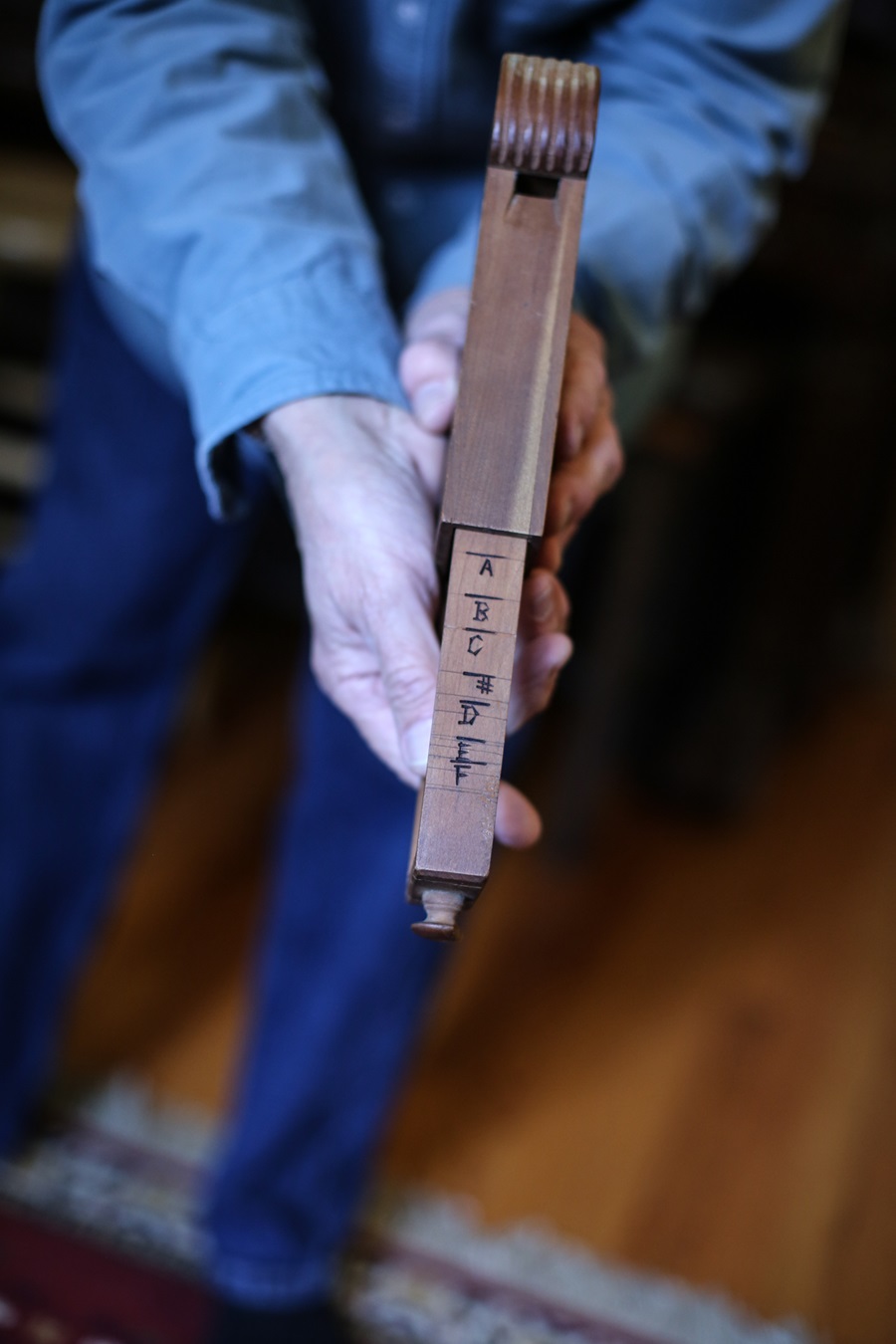
“Let’s see if you know this song,” Buckingham says, picking up a large black flute made of Madagascar rosewood, a copy of an early 1820s instrument. It was built by Ralph Sweet of the Sweetheart Flute Company. The instrument’s sound is light and wispy, yet somehow perfect for a rousing rendition of “Yankee Doodle.”
Most people know the song, Buckingham says, but not its origins. Or what that confusing use of the word “macaroni” means: “ ‘He stuck a feather in his hat and called it macaroni,’ ” Buckingham says, “was not about pasta. At all.”
“Yankee Doodle” was a song originally sung by British soldiers to taunt New England farmers-turned-soldiers during the Revolutionary War, he says. “Macaroni” refers to an elite group of aristocratic young men in England who wore fancy clothing. The British essentially were mocking Americans by saying that they stuck feathers in their hats to try to look more high society than they were.

“What’s the best thing to do when someone makes fun of you?” he asks. “Embrace it.” Americans did just that. Buckingham reveals a page from Newport’s Argus and Spectator, published in 1837. He points to a written advertisement for cooking stoves. “This is supposed to be a singing ad,” he says. The words line up perfectly with the rhythm of “Yankee Doodle.” “Now ladies all and gentlemen, we pray you give attention,” Buckingham sings, “whilst we relate a real tale about a new invention….”
Buckingham will be on stage with some of his instruments at Wellfleet Preservation Hall on May 3. He hopes his audience will come away having learned something about music history as well as “people, community, and where we live,” he says. That evening, he won’t be playing or singing anything written after 1840. Of the instruments he’ll be showing, “some work, and some don’t; some I know how to play, and some I don’t,” he says. “It all becomes very evident.”
History Notes
The event: Tales and tunes with Walter Buckingham
The time: Saturday, May 3, 3 p.m.
The place: Wellfleet Preservation Hall, 335 Main St.
The cost: Free




